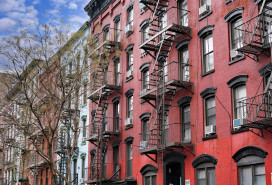Ask Altagracia: What happens if my landlord finds out about my illegal portable washing machine?
- If your landlord decides to enforce the lease terms, the first step will involve mailing a notice to cure
- That means you have an opportunity to resolve the condition that violates the lease

The lease can only be validly terminated if a tenant has failed to cure the violation, which in this case is the washer.
iStock
What would happen if my New York City landlord found out about my portable washer, which is banned by a rider in the lease for my rent-stabilized apartment?
If your landlord decides they want to enforce the terms of the rider, the first step will involve mailing a notice to cure—which means you have an opportunity to resolve the condition that violates the lease.
The notice will offer you 10 days to fix the problem, plus an extra five days if the notice is mailed.
“And they’ll say get rid of this by x day or we’ll see you in court,” said Altagracia Pierre-Outerbridge, an attorney and founder of Outerbridge Law who represents residential landlords, tenants and condo owners.
It’s not uncommon for rental landlords and co-op boards to ban portable clothes washers and dishwashers in older apartment buildings. They can cause plumbing problems, and more importantly, overflow and flood your apartment, which can affect your neighbors downstairs.
If you haven’t removed the washer by the deadline, the landlord can file an eviction case against you. However, there is a silver lining—eviction cases can last several months, if not years.
“When a holdover case is based on a notice to cure, you have up to 10 days after judgment—the end of the eviction case—to successfully cure,” Pierre-Outerbridge added.
So ultimately, a tenant would have until the end of their eviction case to disconnect their portable washer, or correct any other lease violations that formed the basis of the case.
It’s also important to note that a landlord can only refuse to renew your rent-stabilized lease because of your portable washer under very specific circumstances, Pierre-Outerbridge noted.
It would depend on “whether keeping the washer is a violation of a ‘substantial obligation’ of the lease, which means either of the vacancy lease or of a valid addition to the lease authorized by law to be added to a renewal lease,” Pierre-Outerbridge said.
The lease can only be validly terminated if a tenant has failed to cure the violation, which in this case is the washer. If the landlord withholds the lease renewal on a legally shaky basis, then a judge may have grounds to toss an eviction case if the landlord files one.
Altagracia Pierre-Outerbridge, Esq. is the owner of Outerbridge Law P.C. While Outerbridge Law focuses primarily on tenant representation, the firm is also well versed in landlord representation and represents all sides in landlord-tenant litigation and transactional matters such as month-to-month holdovers, nuisance cases, owner’s use cases, licensee cases, harassment claims, repair cases, tenant buyouts, succession claims, DHCR overcharges and rent reductions and more. With nearly 15 years of experience litigating in Supreme, DHCR, and Housing Court, Pierre-Outerbridge has finely developed her legal skills to deliver superior results to her clients and founded Outerbridge Law P.C. to drive this mission. To submit a question for this column, click here.
To contact Outerbridge Law P.C. directly, call 212-364-5612 or 877-OUTERBRIDGE, or schedule a meeting today.
You Might Also Like





























